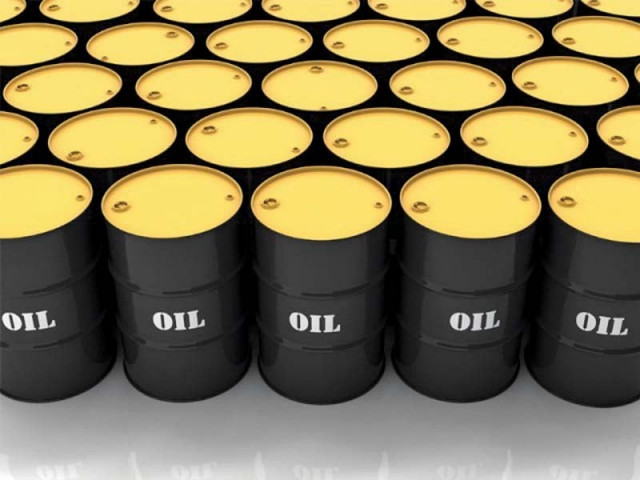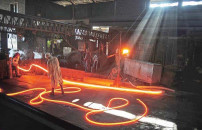2014: A bright start before the dip and slip to the red
Shell CEO calls for revising margin; looks at LNG potential .

Shell CEO calls for revising margin; looks at LNG potential. CREATIVE COMMONS
An otherwise good financial year for Shell Pakistan Limited (SPL) ended with a net loss as slide in oil prices in the last quarter diluted most of gains for the country’s second largest oil marketing company.
SPL on Thursday posted an after tax loss of Rs1.067 billion for the year, ended in December 2014, compared to a profit of almost the same amount the previous year.
But buoyed by better cash flow, including reimbursement of Rs937 million in overdue receivables from the government, directors announced a cash dividend of Rs8 per share – twice what was handed out in 2013.
“We took a Rs4-billion hit in the shape of inventory loss during the year,” said Omar Sheikh, chairman and CEO of the company in an interview with The Express Tribune after the results were announced. “And Rs3 billion came during the fourth quarter (October-December 2014) alone.”
Inventory loss occurs when the value of petroleum products stored in the tanks erode in tandem with dip in international crude oil price.
Up till September 2014, SPL’s ride was smooth with a net income of Rs895.7 million.
Overall, a few factors, including a substantial decline in other operating expenses and a better income from supplementary sources, played their part in shaping the full-year financial result.
Sheikh explained that a steep decline in other operating expenses to Rs216 million from Rs1.76 billion was predominantly due to the stable exchange rate in 2014 relative to the previous year.
Other income of Rs1.3 billion, way above previous year’s Rs300 million, was because of restated doubtful debt and impact of the favorable exchange rate on payables to Royal Dutch Shell’s other companies.
“A few elements are embedded in our aviation business. For instance, if we (SPL) sign a contract with an airline in Pakistan and that airline refuels at another country using Shell’s facility there, then that sister concern would pay us.”
Shell keen to exploit LNG potential
A global petroleum leader, Shell was among the first to enter the race to import liquefied natural gas (LNG) into Pakistan. It was among the companies that bid for Mashal LNG, an LNG import project conceived in 2005 and subsequently shelved.
Now, Engro Corporation has set up a LNG import terminal and the government is arranging the import cargo.

But the terminal has a capacity to handle 600 million cubic feet per day (mmcfd) of gas whereas the government will utilise only 400 mmcfd, leaving spare capacity for private parties.
“We are keenly looking at various opportunities,” Sheikh said. “The market is enormous (for LNG) and we are talking to Engro and different customers.”
Shell has also helped train officials at state-run gas utilities on subject of LNG, he said. “Whatever expertise we have in this field, we are bringing it here.”
Low margins and competition
SPL’s main business is import and distribution of petroleum products, primarily high speed diesel (HSD) and petrol.
To many industry officials, it appears that Shell is not as aggressive in increasing its retail outreach as it was during the last decade. The company has around 786 retail outlets with only seven joining the country-wide network in 2014.
“Pakistan has the lowest margin in the region,” Sheikh said, talking about two rupees and thirty-five paisa that marketing companies earn on sale of each litre of petrol and diesel.
The market is also already ‘over-pumped’ with many petrol pumps running at a low average throughput, he said. “Once commercial environment shifts then, probably, our view will shift too.”
Echoing the industry’s demand, Sheikh said there was a need for a deregulated market to overcome the problem of low margins.
“It could be challenging for the industry to decide prices especially with concerns related to competition. So there is need for a strong regulator if that happens,” Sheikh said.
But this would work, he insists. “Demand is saturated in packets, which also have high competition. The fact that a lot of companies will vie for market share will ultimately drive down price.”
These packets include Karachi, Central Punjab, Peshawar and the route along N-5 National Highway, which runs from Karachi to Torkham.
The lube deal
SPL leads the engine oil and lubricant market in Pakistan with products like Shell Helix and Rimula. In 2013, it drove 5.6% of its revenue from this segment.
The business is immensely profitable. While Sheikh didn’t share profit details of lube oil segment, he did say that “margin is a heck more than what we earn on petrol or diesel.”
SPL spends a substantial sum on marketing and promotion of its brands. He indicated that expansion will continue this year as well especially with the new engine oil made from gas-extracted base oil.
Published in The Express Tribune, March 13th, 2015.
Like Business on Facebook, follow @TribuneBiz on Twitter to stay informed and join in the conversation.



















COMMENTS
Comments are moderated and generally will be posted if they are on-topic and not abusive.
For more information, please see our Comments FAQ